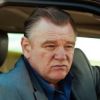Brendan Gleeson

Brendan Gleeson
Brendan Gleesonis an Irish actor. His best-known performances include supporting roles in films such as Braveheart, Gangs of New York, 28 Days Later, Troy, and the Harry Potter films and leading roles in films such as In Bruges, The Guard, and Calvary. He won an Emmy Award in 2009 for his portrayal of Winston Churchill in the film Into the Storm. He is also the father of actors Domhnall Gleeson and Brian Gleeson...
NationalityIrish
ProfessionMovie Actor
Date of Birth29 March 1955
CityDublin, Ireland
CountryIreland
I don't want people poking around in my private stuff. They've no business in it. My work is what I give to people, that's my job, and that's where it stops.
I don't plan in terms of career ambitions. The only career ambition I have is to work with people who are going to bring you up and elevate your performance. They'll let you know things that you didn't know already and bring you places that you might not have gotten to otherwise.
You work for it. You don't have to massage it, so that it fits into the way it has to be. He's just too vigorous a writer and the dialogue is too sparking to do anything other than inhabit it and give it as much truth as you can. You just try to make it part of your DNA. That's what the challenge is, really.
I think most people are decent people. I don't know if they could stand the pressure he's under, but most people aspire to be decent people.
So, to get to play somebody who was insisting on it, in spite of all the evidence was very liberating and exciting. It went quite deep. I suppose I reference a kindness and humility that I would have seen in my parents' generation, a little bit more than now.
We lost faith in authority in the '50s, up to a point, and we spawned a lot of anti-heroes in movies, which were refreshing and open. But at this point, with the distrust that's there and the disillusionment with leadership that is so acute, we need some kind of a focus on taking the irony out and taking the anti-hero element away.
Are there people to aspire to? Can people be strong enough to withstand all of this disillusionment? Maybe the time is right for people to emerge from the easy cynicism and try to get back to a place where we can actually believe in people and trust people to have proper motivations.
I think it's doubly important, now that we see so many people failing. When the norm is an anti-hero, there's a serious loss when you cannot portray a decent person on screen without it becoming slightly sentimental or feeling like it's unrealistic.
I worked with Steven Spielberg on 'AI,' and his level of preparation was extraordinary. He told me there was a time at the beginning when he was a bit more spontaneous and went over budget, and it absolutely wrecked his head. When you look at the power and assuredness of his movies, it makes sense that he works out so much in advance.
I'd never had any problem finding inspiration; Ireland was always just there, you know? All this richness of culture was there to tap into.
I think it was a possibility, I think we're all kind of delusional like that, we think that we can all carry on being who we are without bending ourselves to make ourselves acceptable and expect someone to come along and see to us and rescue to us.
I hope I'm worthy in my dying. I hope I can maintain myself - that I wouldn't become pathetic and needy, and the worst part of myself come out in adversity. But I'm not afraid of it. It'd be such a silly thing to do! To ruin the life you have by fearing its ending.
Winston was a bit of a challenge, all right, from a lot of different perspectives. It wasn't just the culture or the class divide or the historical baggage - it was also the age difference. We had to see if I could be aged-up legitimately, without it becoming some sort of hokey acting challenge.
Everyone's waiting for the seventh book, and looking at each other saying, 'Oh, I wonder will I be in the running?